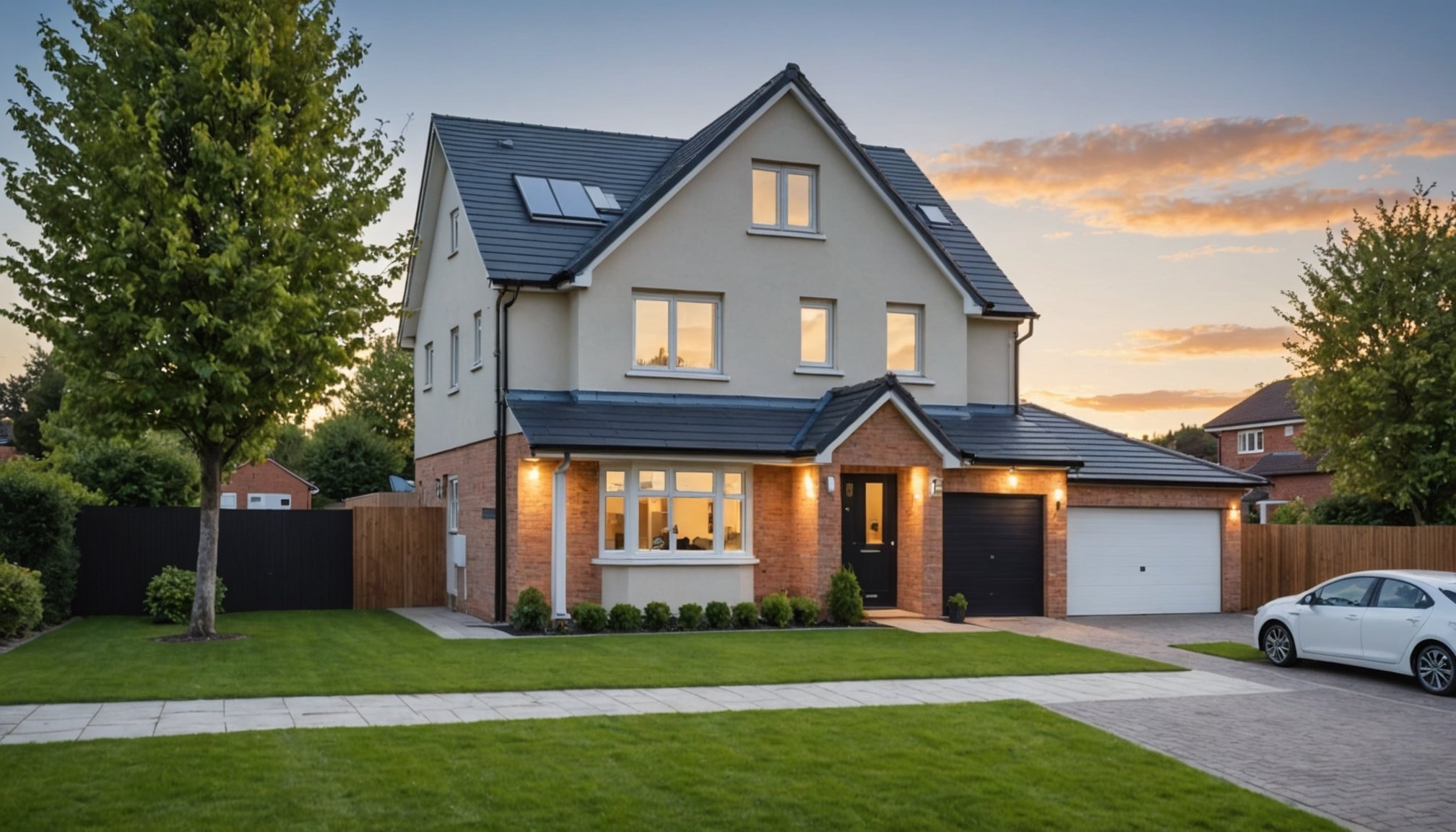Smart home technology is more than just convenience; it can significantly impact your home insurance costs in the UK. Insurers often reward homeowners who invest in smart devices, like security cameras and smoke detectors, with lower premiums. This guide explores how embracing these innovations not only enhances your home's safety but also creates potential savings on your insurance. Discover the smart choices that make your home safer and your wallet happier.
Overview of Smart Home Innovations
Smart home technology has revolutionised the way we interact with our living spaces, making them more efficient and secure. At its core, home automation involves the use of connected devices that communicate with each other to perform tasks autonomously. For instance, smart thermostats can adjust temperatures based on occupancy, while smart lighting systems can be controlled remotely via smartphone apps.
A lire également : Unlocking Value: The Influence of Garden Landscaping on Your Home”s Market Worth and Insurance Costs in the UK
In the UK, there is a growing trend towards adopting smart home technology. According to recent surveys, a significant percentage of households have integrated some form of home automation, such as smart speakers or security cameras. This shift is driven by the desire for convenience and enhanced security, as well as the increasing affordability of these technologies.
The Internet of Things (IoT) plays a crucial role in the advancement of smart home innovations. By connecting various devices, IoT enables seamless communication and data exchange, leading to improved efficiency. For example, IoT-enabled security systems can provide real-time alerts and video feeds, enhancing home security. Additionally, energy management systems use IoT to optimise resource consumption, reducing utility bills and environmental impact.
Cela peut vous intéresser : Unlocking Property Investment: A Young Professional”s Guide to Maximizing the Lifetime ISA
Overall, smart home technology is transforming traditional homes into intelligent environments, offering enhanced comfort, security, and energy efficiency.
Impact of Smart Home Devices on Home Insurance Premiums
Smart home devices are increasingly influencing home insurance discounts and premium reduction strategies. Insurers are recognising the value of these technologies in risk assessment, offering incentives to homeowners who integrate them into their living spaces.
How Insurers Assess Risk with Smart Home Devices
Insurance companies evaluate the potential for loss and damage by examining the smart devices installed in a home. Devices such as smart smoke detectors, security cameras, and water leak sensors can significantly reduce the likelihood of incidents, thereby lowering the risk profile of a property. This leads to a more favourable risk assessment and potential premium reductions.
Specific Devices Leading to Premium Reductions
Certain smart devices are particularly effective in securing home insurance discounts. For instance, installing comprehensive security systems with real-time monitoring and alerts can deter burglaries, while smart thermostats can prevent fires by controlling temperature extremes. These devices not only enhance safety but also demonstrate proactive risk management to insurers.
Insurance Company Policies
Many insurance companies have policies that incentivise smart home usage. These may include reduced premiums for homes equipped with specific smart devices or offering additional coverage benefits. By promoting the adoption of smart technology, insurers encourage homeowners to invest in systems that protect their properties, ultimately benefiting both parties.
Case Studies and Statistics
In recent years, smart home savings have become a notable trend, with numerous homeowners reaping the benefits of insurance discounts. Real-life examples highlight substantial premium reductions. For instance, a case study involving a family in London demonstrated a 15% decrease in their home insurance premium after installing smart security cameras and smoke detectors. This tangible saving underscores the financial advantage of adopting smart home technology.
Statistical Analysis of Premium Reductions
Statistical data further supports these findings. A survey conducted in 2022 revealed that homes equipped with smart devices experienced an average premium reduction of 10-20%. This significant decrease is attributed to the enhanced security and risk management capabilities provided by these technologies.
Comparison of Insurance Premiums
Comparative analyses show a stark difference in insurance costs before and after smart home upgrades. Homeowners who invested in smart thermostats, leak sensors, and security systems reported lower insurance premiums compared to those without such devices. This comparison illustrates the cost-effectiveness of smart home technology in reducing long-term expenses.
Overall, these insurance case studies and statistical insights provide compelling evidence of the cost benefits associated with integrating smart devices into homes.
Benefits of Integrating Smart Home Technologies
Integrating smart home technologies offers substantial benefits that enhance both security and energy efficiency, leading to significant savings.
Enhanced Security Features
Smart home devices provide robust security enhancements, crucial for reducing insurance costs. Devices like smart cameras and motion sensors deter potential intruders, while smart locks offer advanced access control. These technologies not only protect your home but also lower insurance premiums by presenting a reduced risk profile to insurers.
Energy Efficiency Improvements
Smart thermostats and lighting systems contribute to energy efficiency by optimising power usage. For instance, smart thermostats adjust heating or cooling based on occupancy, leading to reduced energy consumption. Similarly, smart lighting systems automatically turn off when rooms are unoccupied. These features result in lower utility bills, offering a tangible return on investment.
Overall Value Proposition
The overall value proposition of investing in smart home technology is compelling. While initial costs may be a consideration, the long-term savings from reduced energy bills and insurance premiums make it a financially sound decision. Additionally, the enhanced convenience and security add intangible value, improving your quality of life. Embracing smart home innovations is not just about technology—it's about creating a safer, more efficient, and cost-effective living environment.
Practical Tips for Homeowners
Incorporating smart home installation can be straightforward and budget-friendly. Here are some homeowner tips for making cost-effective upgrades.
Affordable Smart Home Devices to Consider
Start with devices that offer immediate benefits without significant investment. Smart plugs and bulbs are affordable and can be controlled remotely, allowing for energy savings. Smart speakers with virtual assistants provide convenience and can act as a central hub for other devices. Security cameras offer peace of mind and potential insurance discounts.
Steps for Integrating Smart Technology into Existing Homes
Begin by assessing your home's needs. Prioritise areas where technology can enhance security or efficiency. Gradually add devices, starting with those that require minimal installation, such as smart thermostats or cameras. Ensure compatibility with existing systems to avoid unnecessary expenses.
How to Communicate with Insurance Providers About Smart Home Features
When discussing your smart home setup with insurance providers, highlight features that mitigate risks, like security systems and smoke detectors. Provide documentation or receipts to support your claims. Ask about potential premium reductions or additional coverage benefits tied to your smart home investments. This proactive approach can lead to significant savings.
Insights into the UK Insurance Market
The UK home insurance market is evolving with the integration of smart home technologies. As homeowners increasingly adopt these innovations, insurance providers are adjusting their policies to accommodate new trends. The landscape is marked by a growing emphasis on risk reduction through technology, leading to more competitive offerings.
Key Insurance Providers Offering Smart Home Discounts
Several leading insurers in the UK are now offering smart home discounts. Companies like Aviva, Direct Line, and AXA are at the forefront, providing incentives to customers who install smart security systems or energy-efficient devices. These discounts reflect a broader market trend towards recognising the value of technology in mitigating risks.
Future Trends in the UK Insurance Market
Looking ahead, the UK home insurance market is expected to further embrace smart home innovations. As technology continues to advance, insurers will likely expand their offerings, incorporating more sophisticated risk assessment tools. This shift will not only benefit policyholders through potential premium reductions but also enhance the overall security and efficiency of homes. The ongoing development of smart home technology promises to reshape traditional insurance models, offering new opportunities for both providers and consumers.
Conclusion and Recommendations
The smart home future is promising, especially in the context of home insurance. As these technologies continue to evolve, they offer homeowners a unique opportunity to reduce costs and enhance security. Here are some key insurance recommendations and homeowner advice for those looking to capitalise on these innovations.
To begin with, homeowners should prioritise integrating smart devices that are recognised by insurers for their risk-reducing capabilities. Smart security systems, including cameras and alarms, are highly recommended as they can deter intruders and provide real-time alerts. Additionally, smart smoke detectors and water leak sensors are invaluable for preventing damage and accidents.
Homeowner advice suggests that when upgrading to smart technology, consider starting with devices that offer immediate benefits and are easy to install. This approach allows for gradual integration without overwhelming costs.
Furthermore, keep communication open with your insurance provider. Highlight the smart devices you've installed and inquire about potential premium reductions. This proactive step can lead to significant savings.
In conclusion, embracing the smart home future not only enhances the safety and efficiency of living spaces but also offers tangible financial benefits through reduced insurance premiums.











